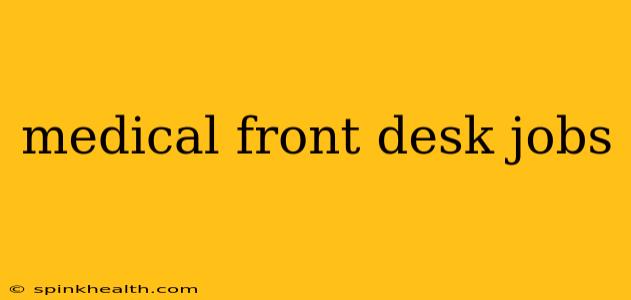The hum of activity, the constant flow of patients, the vital role in ensuring a smooth-running medical practice – this is the world of the medical front desk. It's a demanding yet rewarding career path, offering a blend of administrative skills, interpersonal abilities, and a deep sense of contributing to healthcare. But what exactly does a medical front desk job entail? Let's delve into the details, answering some frequently asked questions along the way.
What are the day-to-day tasks of a medical front desk receptionist?
My journey into the medical field started unexpectedly. After years in customer service, a friend suggested I try a medical front desk position. Initially, I was apprehensive – healthcare seemed intimidating. But my first day shattered those fears. The work was challenging, engaging, and deeply satisfying. A typical day involves a whirlwind of activities: greeting patients with a warm smile, answering phones (often multiple lines at once!), scheduling appointments, managing patient records (both paper and electronic), processing insurance claims, handling payments, and managing the overall flow of the office. It's a constant juggle, requiring excellent organizational skills and the ability to prioritize tasks efficiently. I quickly learned the importance of multitasking and staying calm under pressure – essential skills for thriving in this role.
What skills are necessary for a successful medical front desk career?
Beyond the technical skills, the personal qualities are equally crucial. I found that my previous experience in customer service was invaluable. Patience, empathy, and excellent communication skills are paramount. You're often the first point of contact for patients, many of whom may be anxious or in distress. Your ability to create a welcoming and reassuring atmosphere is vital. Strong computer skills are also essential, particularly proficiency in medical software and electronic health records (EHR) systems. My current practice uses a specific EHR system, and mastering its intricacies was a significant part of my initial training. Moreover, a keen eye for detail is crucial when handling sensitive patient information and ensuring accurate billing and insurance processing.
What qualifications do I need to work as a medical front desk receptionist?
While a formal medical degree isn't required, many employers prefer candidates with at least a high school diploma or GED. Some positions may require additional certifications, such as a Certified Medical Assistant (CMA) or a Registered Medical Assistant (RMA). These certifications demonstrate a higher level of medical knowledge and can significantly boost your job prospects. My personal journey involved on-the-job training, but having a CMA certification would have undoubtedly made my initial transition smoother. Many community colleges and vocational schools offer these certifications, providing a pathway to enhance your skill set and increase your earning potential.
What is the salary range for medical front desk jobs?
Salary expectations can vary widely depending on factors such as location, experience, and the size of the practice. Larger medical facilities generally offer higher salaries and more comprehensive benefits packages. Entry-level positions often fall within a specific range, but with experience and added certifications, your earning potential can significantly increase. Researching salary data specific to your region is crucial to understanding what to realistically expect.
How can I find medical front desk jobs?
The job hunt itself can be a journey. Online job boards are a great starting point – sites like Indeed, Monster, and LinkedIn frequently post medical front desk openings. Networking within your community and reaching out to local medical practices directly can also yield positive results. I personally benefited from word-of-mouth referrals – a friend’s recommendation landed me my current position. Tailoring your resume and cover letter to highlight relevant skills and experience for each specific job application is key to making a strong impression on potential employers.
What is the career progression path for a medical front desk receptionist?
The medical front desk role is not simply a stepping stone – it's a career with potential for growth. With experience and demonstrated competence, you could advance to roles such as office manager, medical billing specialist, or even practice administrator. Continuously expanding your skills and seeking opportunities for professional development can significantly enhance your long-term career prospects in the dynamic field of healthcare administration. My personal goal is to eventually become an office manager, utilizing my experience and knowledge to contribute to the overall success of the practice.
The world of medical front desk jobs is far richer and more multifaceted than one might initially imagine. It’s a career that demands attention to detail, compassion, and adaptability, all while offering a rewarding sense of contributing to a vital aspect of healthcare. It's a career where every day presents new challenges and opportunities for growth, and that's what makes it so truly rewarding.

